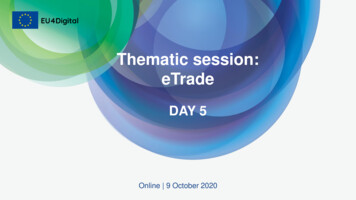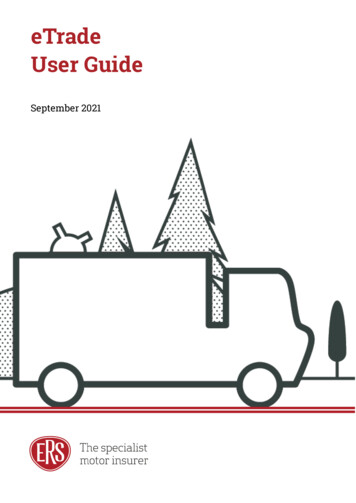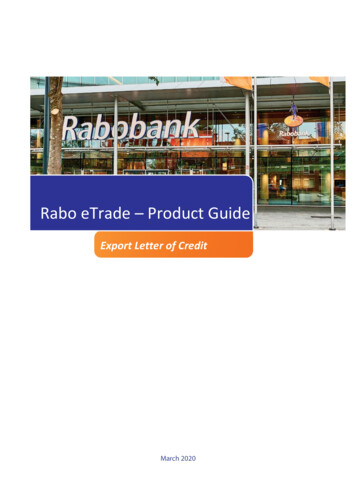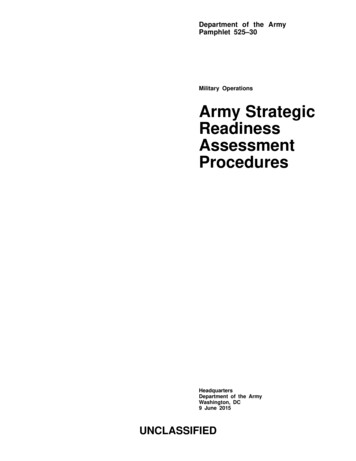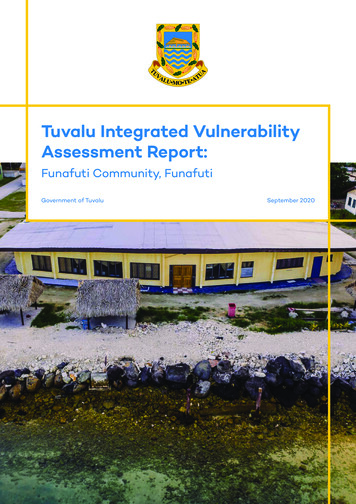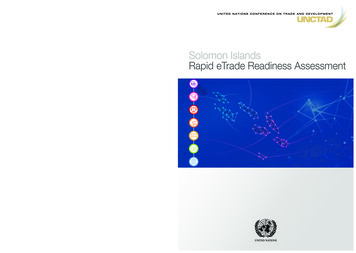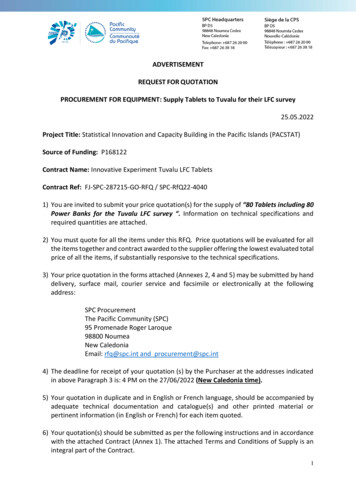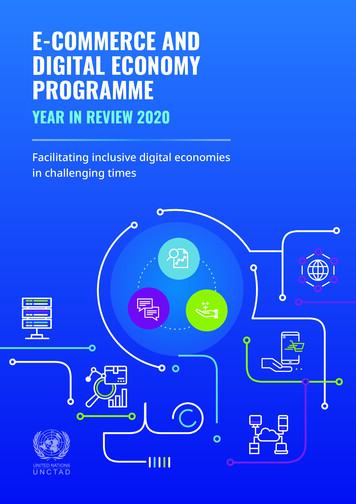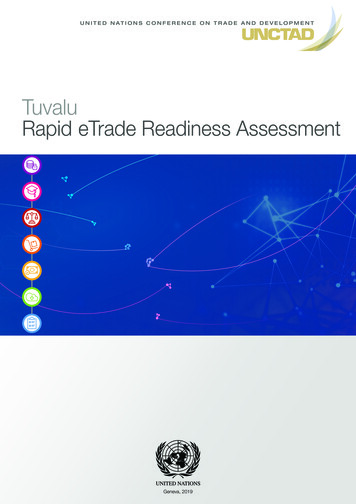
Transcription
U N I T E D N AT I O N S C O N F E R E N C E O N T R A D E A N D D E V E L O P M E N TTuvaluRapid eTrade Readiness AssessmentGeneva, 2019
Tuvalu Rapid eTrade Readiness AssessmentII 2019, United NationsThis work is available open access by complying with the Creative Commons licence created for intergovernmentalorganizations, available at e findings, interpretations and conclusions expressed herein are those of the authors and do not necessarilyreflect the views of the United Nations, its officials or Member States.The designation employed and the presentation of material on any map in this work do not imply the expressionof any opinion whatsoever on the part of the United Nations concerning the legal status of any country, territory,city or area or of its authorities, or concerning the delimitation of its frontiers or boundaries.Photocopies and reproductions of excerpts are allowed with proper credits.This publication has been edited externally.United Nations publication issued by the United Nations Conference on Trade and Development.UNCTAD/DTL/STICT/2019/13eISBN: 978-92-1-004615-2
NOTEIIINOTEWithin the UNCTAD Division on Technology and Logistics, the ICT Policy Section carries out policy-orientedanalytical work on the development implications of information and communication technologies (ICTs) ande-commerce. It is responsible for the preparation of the Digital Economy Report (DER) as well as thematic studieson ICT for Development.The ICT Policy Section promotes international dialogue on issues related to ICTs for development and contributesto building developing countries’ capacities to measure the information economy and to design and implementrelevant policies and legal frameworks. It also monitors the global state of e-commerce legislation (unctad.org/cyberlawtracker). Since 2016, the section has coordinated a multi-stakeholders’ initiative entitled eTrade for all(etradeforall.org), which aims to improve the ability of developing countries, particularly least developed countries(LDCs), to use and benefit from e-commerce.Reference to companies and their activities should not be construed as an endorsement by UNCTAD of thosecompanies or their activities.The following symbols have been used in the tables:Two dots (.) indicate that data are not available or are not separately reported. Rows in tables have been omittedin those cases where no data are available for any of the elements in the row;A dash (-) indicates that the item is equal to zero or its value is negligible;Reference to “dollars” (US ) means United States of America dollars, unless otherwise indicated;Details and percentages in tables do not necessarily add up to the totals because of rounding.Tuvalu national currency is the Australian Dollar (AUD ). For the purpose of this report: US 1 AU 1.428 andAU 1 US 0.70 (September 23, 2019).
Tuvalu Rapid eTrade Readiness AssessmentIVPREFACEThe eTrade for all Initiative, launched at the fourteenth Ministerial Conference of UNCTAD in July 2016, is a practicalexample of how to harness the digital economy in support of the 2030 Agenda for Sustainable Development,notably Sustainable Development Goals (SDGs) 5, 8, 9, and 17. The initiative seeks to raise awareness, enhancesynergies, and increase the scale of existing and new efforts by the development community to strengthen theability of developing countries to engage in and benefit from e-commerce by addressing seven relevant policyareas: E-commerce readiness assessment and strategy formulation ICT infrastructure and services Trade logistics and trade facilitation Payment solutions Legal and regulatory frameworks E-commerce skills development Access to financingAs part of the initiative, demand-driven assessments are envisaged to provide a basic analysis of the currente-commerce situation in the countries concerned, and to identify opportunities and barriers. The resulting reportswill serve as a valuable input to these countries’ involvement in various discussions related to e-commerce anddigital trade, such as in the context of the UNCTAD Intergovernmental Group of Experts on E-commerce andthe Digital Economy.It may furthermore help LDCs to identify areas in which they could benefit from assistance by partners of eTradefor all.The Tuvalu Rapid eTrade Readiness Assessment is the nineteenth such assessment conducted by UNCTADand the fourth for a Pacific Islands Nation, after Samoa in July 2017, Solomon Islands and Vanuatu in 2018.As part of UNCTAD’s efforts to support the development of digital trade in the Pacific Islands, another eTradeReadiness Assessment is underway in Kiribati. With this report, UNCTAD contributes to the recommendationsof the joint WTO/UNCTAD/PIFS June 2017 Workshop on e-Commerce for the Pacific to have all Pacific IslandsForum Secretariat members benefit from an eTrade Readiness Assessment as a first step towards developinga coherent regional e-commerce policy. The Tuvalu Rapid eTrade Readiness Assessment and action matrixcontributes as well to the Pacific Aid-for-Trade strategy and Trade Policy Framework of Tuvalu.With the eTrade for all partners, UNCTAD is committed to supporting Tuvalu and other Pacific Islands Nations intheir resolve to harness the potential of e-commerce for development.Shamika N. SirimanneDirector, Division on Technology and Logistics, UNCTAD
PREFACEVThe EIF has continued on the path of assisting the Least Developed Countries (LDC) to better integrate into aglobal digital economy. The Rapid eTrade Readiness Assessments remain a crucial part of the EIF’s efforts insupporting beneficiaries’ use of trade for development.Tuvalu’s eTrade Readiness Assessment is one of nine EIF supported assessments. These assessments haveprovided concrete diagnoses of the digital landscape in the LDCs, as well as policy recommendations for targetedinterventions by governments, the private sector and development partners.The Government of Tuvalu has recognized e-commerce as a priority. This has been made evident in the “TeKakeega III: National Strategy for Sustainable Development 2016-2020”. This is a positive sign for the emergenceof a national digital landscape that encourages reforms, innovation and investment.E-commerce activity in Tuvalu remains nascent, with the bulk of internet-based transactions concentrated in thehospitality industry. This report highlights that the potential for e-commerce uptake equally exists in other sectors,such as retail, services and handicrafts. In addition, Tuvalu stands to benefit from digital technologies in managingthe risks of climate change and other environmental threats.Fixed broadband penetration is currently at 10% – a high percentage, compared to most other South Pacificnations. Improving the information and communications technology (ICT) infrastructure is among the toppriorities. Tuvalu’s landscape of nine inhabited coral atolls has, however, affected mobile subscriber penetration,which currently stands at about 31%. Internet user penetration is at 46%. Investments in the telecommunicationssector to complement the services of the Tuvalu Telecommunications Corporation remain essential. Accessto affordable and reliable ICT can play a key role in Tuvalu’s development in the coming years. Investments toimprove internet connectivity by development partners are one of the positive developments highlighted by thereport.Like other Pacific islands LDCs, Tuvalu’s assessment has revealed bottlenecks in trade logistics related to interisland connectivity. This remains a major constraint for investments in e-commerce. Trade facilitation reformshave been recognized as an important area and are now included in Tuvalu’s National Strategy for SustainableDevelopment.The EIF’s support has proven to be fundamental in addressing some of the recommendations identified in eTradeReadiness Assessments conducted in the past. These include support to e commerce strategy formulation,capacity development and coordination in Bhutan, Cambodia, Myanmar, Nepal, Rwanda and Senegal, and atargeted project for women-led small- and medium sized enterprises in the South Asian region.I would like to express my appreciation to the authors of the report and our colleagues at UNCTAD for bringingforth the state of play of e-trade readiness in Tuvalu, taking stock of recent progress and identifying the necessaryactions that will further support digital development. I would also like to express my gratitude to Mr TemateMelitiana, Permanent Secretary, Ministry of Foreign Affairs, Trade, Tourism, Environment and Labour; Ms PulaalofaSaulo Haulagi, Coordinator of the EIF National Implementation Unit in Tuvalu; and the Government of Tuvalu fortheir commitment in realizing the country’s potential in the digital economy.The EIF stands ready to support Tuvalu’s trade-led development efforts, including leveraging technology forbetter trade, in any way it can.Ratnakar AdhikariExecutive DirectorExecutive Secretariat for the EIF
VITuvalu Rapid eTrade Readiness AssessmentACKNOWLEDGEMENTSThis Rapid eTrade Readiness Assessment for Tuvalu was prepared by Sven Callebaut, UNCTAD Consultant, inclose collaboration with a team comprising Cécile Barayre, Mohamad Fakhreddin, Iris Macculi, Htet Myat Minand Marian Pletosu, under the overall guidance of Torbjörn Fredriksson.Profound gratitude goes out to the Honourable Mr. Taukelina Finikaso, Minister, Ministry for Foreign Affairs, Trade,Tourism, Environment and Labour for requesting UNCTAD support in assessing Tuvalu’s eTrade Readiness; Mr.Fakavae Taomia, CEO, EIF Focal Point, MFATTEL, for chairing the in-country focus group discussion for publicsector stakeholders; and Mr. Itaia Lausaveve, for chairing the in-country focus group discussion for private sectorstakeholders. The support provided by Mrs. Pulaalofa Haulagi, Trade Officer and EIF Coordinator, MFATTELbefore, during, and after the in-country mission was very much appreciated. Feedback received from Mr. ShivRaj Bhatt, International Trade Adviser, MFATTEL have contributed to improving the quality and accurateness ofthe report.The assessment benefited from inputs from more than 75 Tuvaluan institutions in both public and private sectors,through the online eT-Ready surveys and subsequent interviews in Funafuti. Special thanks go to representativesof the Ministry of Communications and Transport (MCT), the Ministry of Finance and Economic Development(MFED), the Ministry of Education, Youth and Sports (MEYS), the Ministry of Foreign Affairs, Trade, Tourism,Environment and Labour (MFATTEL), the National Development Bank (NDB), Tuvalu Telecom, and Tuvalu Post forparticipating in the focus group discussions and sharing their first-hand experience in bilateral meetings.Comments and inputs provided by the following eTrade for all partner agencies have substantially improved thefinal report: ITC, UNCITRAL and UPU as well as from UNCTAD’s ASYCUDA Regional Office for the Pacific (in Fiji).In Geneva, the assessment was made possible thanks to the timely support of the Honourable Mere Falemaka,Ambassador and Dr. Andrea Giacomelli, Aid-for-Trade Adviser, from the Permanent Representation of the PacificIslands Forum Secretariat (PIFS) to the World Trade Organization (WTO) in Geneva.Desktop publishing and cover prepared and designed by Magali Studer. The document has been externallyedited by Nancy Biersteker.The Enhanced Integrated Framework (EIF), a core partner of the eTrade for all initiative, provided funding for thisreport.
TABLE OF CONTENTVIITABLE OF CONTENTSNOTE. IIIPREFACE. IVACKNOWLEDGEMENTS. VIABBREVIATIONS.VIIIEXECUTIVE SUMMARY. 1METHODOLOGY. 4SUMMARY OF MAIN FINDINGS AND MAIN RECOMMENDATIONS. 5FINDINGS UNDER THE SEVEN ETRADE FOR ALL POLICY AREAS. 71. E-COMMERCE READINESS ASSESSMENT AND STRATEGY FORMULATION. 72. ICT INFRASTRUCTURE AND SERVICES. 163. TRADE LOGISTICS AND TRADE FACILITATION. 224. PAYMENT SOLUTIONS. 285. LEGAL AND REGULATORY FRAMEWORKS. 306. E-COMMERCE SKILLS DEVELOPMENT. 327. ACCESS TO FINANCING. 35CONCLUSION. 38THE WAY FORWARD: ACTION MATRIX. 39Annex I: Tuvalu country profile on etradeforall.org. 43Annex II: Bibliography and websites used. 45Annex III: List of UNCTAD Rapid eTrade Readiness Assessments of LDCs. 46
VIIITuvalu Rapid eTrade Readiness ATMATRAU MFEDMIRABMSMEsNBTAsia Broadcast SatelliteAsian Development BankAid-for-TradeAnti-Money Laundering and Counter-Terrorism Financing ActAsian-Pacific Postal UnionUNCTAD Automated System for Customs DataAutomated Teller MachineAvions de Transport RégionalAustralian DollarBusiness-to-ConsumerCentre for Excellence in Information TechnologyCash on DeliveryDevelopment Bank of TuvaluDigital Financial ServicesDesignated postal operatorsDevelopment PartnerDistance to FrontierDiagnostic Trade Integration Study 2016Electronic Funds Transfer at Point of SaleEnhanced Integrated FrameworkFocus Group DiscussionFinancial Service ProviderGross Domestic ProductGovernment of TuvaluInternet Assigned Numbers AuthorityInformation and Communication TechnologyInternational Development AssociationInternational Finance CorporationInternet ProtocolInternet Service ProviderInformation TechnologyInternational Telecommunication UnionKnow-Your-CustomerLeast Developed CountryMinistry of Communications and TransportMinistry of Finance and Economic DevelopmentMillennium Development GoalsMinistry of Education, Youth and SportsMinistry of Foreign Affairs, Trade, Tourism, Environment and LabourMinistry of Finance and Economic cro Small and Medium-sized EnterprisesNational Bank of Tuvalu
ABBREVIATIONSNDPNPLNSSDNTDSNTONTSCOREPACERPACER RALUNCTADUNCDFUPUUS USPUSPNeWBWEFWTONational Development PlanNon-performing loansNational Strategy for Sustainable DevelopmentNational Tourism Development StrategyNational Tourism OfficeNational Trade Steering CommitteeOperational Readiness for E-commercePacific Agreement on Closer Economic RelationsPacific Agreement on Closer Economic Relations PlusPublic Enterprise Reform Monitoring UnitPacific Financial Inclusion ProgrammePacific Island CountriesPacific Islands Forum SecretariatPacific Islands Private Sector OrganisationPoint of SalePublic-Private PartnershipPayment Service ProviderPacific Trade and InvestState-owned enterpriseSanitary and phytosanitarySouth Pacific Tourism OrganisationTechnical AssistanceTuvalu Association of Non-Governmental OrganisationsTuvalu Customs Revenue and Border Protection DepartmentTrade Facilitation AgreementTourism and Hospitality Association of TuvaluTe Kakeega III (National Strategy for Sustainable Development 2016-2020)Tuvalu National Provident FundTuvalu National Private Sector OrganizationTuvalu PostTrade Policy FrameworkTuvalu Private Sector Development PlanTuvalu Telecommunications CorporationTuvalu Telecommunications and ICT Development ProjectUnited Nations Commission on International Trade LawUnited Nations Conference on Trade and DevelopmentUnited Nations Capital Development FundUniversal Postal UnionUnited States DollarUniversity of the South PacificUSP Satellite Communication NetworkWorld BankWorld Economic ForumWorld Trade OrganizationIX
XTuvalu Rapid eTrade Readiness Assessment
EXECUTIVE SUMMARY1EXECUTIVE SUMMARYWith an estimated population of just over 11,000and a total land area of 26 square kilometers, Tuvalufaces a number of unique development challenges.Its economic potential is constrained by the lack ofnatural resources; a small domestic market and anunderdeveloped private sector. Its geographic locationand fragmentation across nine islands and atolls makefor difficult and expensive access to major internationalmarkets and high inter-island transport costs. Tuvaluis highly dependent on imports, the bulk of whichconsists of food, fuel, building materials, medicineand medical equipment, as well as most consumerproducts including motor vehicles, appliances, andclothing. Tuvalu has been characterized as a )economy, predominated by government activities.With limited opportunities for private business, thecountry relies on its public sector as the main driver ofgrowth. Tuvalu is one of the least connected countriesin the world, with high-cost and limited Internetservices. Poor connectivity constrains business andtourism opportunities as well as the ability to respondquickly to natural disasters.E-commerce readiness assessment and strategyformulationThe Te Kakeega III (TKIII), i.e., National Strategy forSustainable Development 2016-2020, asserts that“modern economies and societies are now built onWi-Fi, mobile telecommunications and the Internet.Tuvalu cannot be left behind any longer.” Despitethis, the TKIII does not capture e-commerce and thedigital economy as a critical area to sustain Tuvalu’seconomy and neither has the country adopted afocused stand-alone e-commerce policy and strategy.Nonetheless, a number of polices and strategies,including DTIS and TPF, have addressed issuesrelated to e-commerce, especially in the areas of ICTdevelopment, e-government strategy and support tobusiness development. Diversification of sources ofgrowth and increased private sector-led employmentand income-generation are important medium-termdevelopment goals.The overall e-commerce enabling environment inTuvalu is in a nascent stage. The Government of Tuvalu(GOT) capacities to strategize and implement a digitaleconomy development agenda are still lacking, andthe private sector consists roughly of 200 registeredbusinesses scattered around the nine islands thecountry comprises. Policy coordination and dialogueamong different stakeholders in the e-commerceecosystem needs to be organized, possibly buildingon the initial steps taken during the eTrade Readinessassessment.ICT infrastructure and servicesInformation and Communication Technologies (ICT)services are costly in Tuvalu, of limited variety andvariable quality. Mobile penetration is at 31 per centwhile Internet use is at 46 per cent (including mobile,fixed broadband and Wi-Fi). Given the capacitylimitation, access to Internet is very costly comparedwith other Pacific economies; services are limitedparticularly outside the main island of Funafuti.This situation affects communications betweenhouseholds, the cost of doing business, and deliveryof services. The lack of ICT services constrainsbusiness development, tourism, and management ofnatural disasters. In this context, e-commerce serviceproviders are not in place yet.In order to improve access to ICT, the Government haslaunched a number of initiatives aimed at improvingaccess to affordable and reliable telecommunicationsservices, with a particular emphasis on strengtheningICT infrastructure on the outer islands. The largestinfrastructure development project for the country isthe Tuvalu Telecommunications and ICT DevelopmentProject, sponsored by the World Bank through a US 29 million grant. The project is aimed at improving theoverall telecommunications infrastructure and relatedaccess for Tuvalu. The three key areas of interventionsinclude development of an ICT policy, reforming theTuvalu Telecom Corporation through a PPP involvingan international telecommunications operator via acompetitive process, and supporting investmentsin a submarine cable for provision of faster, reliableand economical Internet bandwidth. The project waslaunched in January 2019 and is envisaged to run until2023.Trade logistics and trade facilitationThe limited number of both domestic and internationaltrade opportunities in Tuvalu and the lack of basicphysical infrastructure remain major barriers to theeconomic development of and service delivery to
2the eight Outer Islands. The main island of Funafutiis the economic hub, and transport on the island isconstrained by the its size. Given the small population,there are presently no major issues with delivery of mailsand parcels. Tuvalu Post is limited in the developmentof its operational readiness for e-commerce, sinceits access to technical assistance from UPU hasbeen limited because of unpaid membership anddues. Tuvalu is not a member of the WTO but thegovernment department in charge of Customs isopen to supporting reforms stemming from the WTOTrade Facilitation Agreement, in adherence to theCustoms Revenue and Border Protection Act 2014.The UNCTAD ASYCUDA Programme implementationshould start soon, thanks to funding available underPACER . The WB-funded Tuvalu Telecommunicationsand ICT Development Project also engaged in Tonga,Samoa, Fiji, the Federated States of Micronesia(with Palau), and Kiribati. When it is completed, theenhanced capacity from the submarine cable couldincrease the potential for local businesses to engagein e-commerce activities and possibly increase interisland exchanges.Payment solutionsCash is the main means of payment used bybusinesses in Tuvalu. Private sector development ishampered by the weakness of the financial sector, aswell as the absence of ATMs and credit card facilities.The few cross-border e-commerce transactions madeby Tuvalu consumers and businesses are carriedout using foreign banking systems. A pilot projectwas supposed to have taken place in August 2019during the PIFS Leaders’ Summit held in Tuvalu, withthe introduction of POS and ATM on a trial basis butwas postponed until 2020 for technical reasons. It isexpected to be launched in near future. Tuvalu TelecomCorporation introduced a mobile phone-based moneytransfer, initially SMS-based until a mobile app waslaunched in 2018, but its use is still sporadic due tolack of ICT literacy and frequent Internet downtime.Legal and regulatory frameworkNo legal framework currently exists for electronictransactions, data protection and online consumerprotection. The development of an enabling legalframework for e-commerce laws is considered ascrucial by public and private stakeholders but wasnot part of the reform agenda. In 2019, only the lawaddressing cybercrime was formulated, with plansTuvalu Rapid eTrade Readiness Assessmentto develop a Consumer Act soon. Efforts need to betaken to develop the necessary skills in-country, whileusing best practices on international trade law, aspromoted by UNCITRAL and UNCTAD to ensure thatconsumers and businesses gain confidence in onlinetools.Skills development for e-commerceLimited connectivity and lack of trust in e-commercein Tuvalu also translates into low use of the Internetfor business purposes, signaling a general need tosupport digital adoption and literacy. Higher educationand training programs have not yet embraced curriculasuitable to develop e-commerce skills, but mostlytarget traditional ICT engineering and basic officesoftware skills. Despite this, as seen in all Pacific IslandsNations, the University of the South Pacific offers onlinecourses for a variety of business and engineeringcourses, with stable access to the Internet madepossible through investment in satellite connections.The business and trade development support systemhas to rethink its business development services andintegrate support for digital transformation. The TKIIIproposes the establishment of incubators for originalideas contextualized in the development and marketrequirements of Tuvalu.Access to financingThe last major area of challenges identified in thisrapid assessment relates to the difficulty of accessingfunding options by companies, particularly MSMEs,since there are limited options from the commercialsystem and loans are usually provided for consumptionor real estate development. Public funding supportis unavailable, as there are no public guaranteeschemes, grants or subsidized loans available forventuring e-commerce businesses. Paradoxically, theGovernment of Tuvalu (GOT) derived revenue from theInternet when in 1999 it leased its Internet domain“.TV” to a Californian company, DotTV, which paidTuvalu US 50 million – more than half Tuvalu’s annualGDP at the time. The lease has returned around US five million per year, which makes up about 10 percent of its annual gross domestic product (GDP) forthe past 10 years. It would appear logical to use part ofthis revenue source for ICT and business developmentback in Tuvalu.In conclusion, there are signs that Tuvalu hasstarted to consider some of the potential benefitsthat e-commerce can bring to its population and in
FINDINGS UNDER THE SEVEN ETRADE FOR ALL POLICY AREASparticular in reducing some of the negative effectsof its geographic location and small size. For thisto happen, existing policies such as TKIII and TPFmust be implemented, while higher visibility of thedigital economy in the national development agendaconstitutes a necessary pre-condition to tackle all theaforementioned challenges.This Rapid eTrade Readiness Assessment helps identifyopportunities and barriers for Tuvalu to engage in andbenefit from e-commerce and the digital economy. Italso helps operationalize relevant strategies includedin the Tuvalu’s Trade Policy Statement and the TuvaluPrivate Sector Development Plan. Both documentshighlight agriculture, fisheries, tourism and labormobility as key areas of export growth, all of whichcould be supported by e-commerce. They also noteother important cross-cutting areas that are relevantto e-commerce, including competition policy andconsumer protection, public procurement, intellectualproperty rights, and gender issues.3This assessment seeks to support Tuvalu’s effortto leverage additional resources from developmentpartners to address these barriers. Figure 1 below givesan indication of the most relevant solutions highlightedby UNCTAD survey respondents. Tuvalu shouldcontinue to seek assistance from multilateral agenciessuch as the ADB and the World Bank and bilateraldonors like Australia and New Zealand, to carry outfurther studies on the best modalities to facilitate betterICT services, including digitization of Governmentprocesses, digitization of MSMEs (moving from offlineto online to e-commerce) and to boost businessopportunities through the use of the submarine cable.The strong relations between Tuvalu, Fiji and NZ, dueto the presence of a relatively large Tuvaluan diaspora,could bring potential for e-commerce and mobilebanking services development in Tuvalu.Figure 1: Priority actions to accelerate e-commerce adoption in TuvaluPlease select 3 key actions from the list below that you believe could grow/enhancee-commerce in Tuvalu (36 respondents, public and private sector)Develop a national strategy or development planfor e-commerce developmentCarry out a regulatory gap analysis on e-commerce in order to assess needsto update and/or upgrade e-commerce related lawsFormalize the interministerial discussions on e-commerce into a proper taskforce or committeeEnsure higher segments of population outside the main island have access tofast, reliable (3G and then 4G/LTE) Internet access through mobile phonesProvide technical assistance to firms in order to enhance their capacityto develop and present bankable proposalsInitiate drafting of an e-commerce law supporting the developmentof a conducive e-commerce ecosystemIncrease awareness of incubators, business acceleratorsand venture capitalists among MSMEsAccelerate measures to improve financial inclusion,especially for youth and womenIncorporate basic digital skills into the national curriculumbeginning in primary schoolAssess current e-commerce and ICT skill gaps to accelerate the developmentof ICT related curricula in line with e-commerce industry’s needs.Increase confidence of merchants to accept electronic payments,through dedicated awareness raising programmesAc
The eTrade for all Initiative, launched at the fourteenth Ministerial Conference of UNCTAD in July 2016, is a practical example of how to harness the digital economy in support of the 2030 Agenda for Sustainable Development, notably Sustainable Development Goals (SDGs) 5, 8, 9, and 17. The initiative seeks to raise awareness, enhance
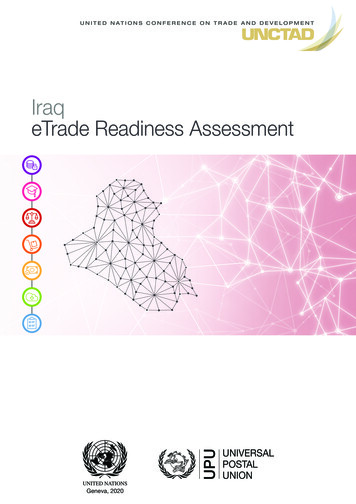
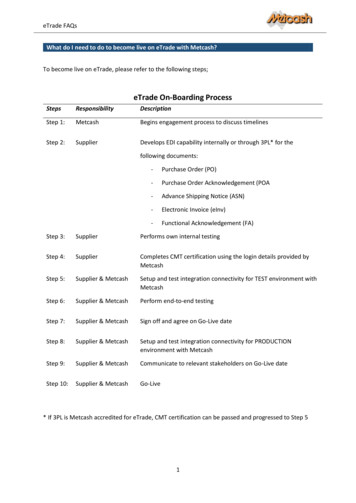
![Kenya: eTrade Readiness Assessment [ADVANCE COPY]](/img/24/dtlecdc2022d2-en.jpg)
